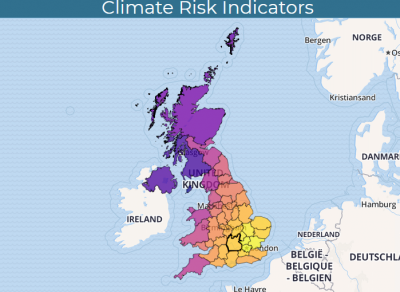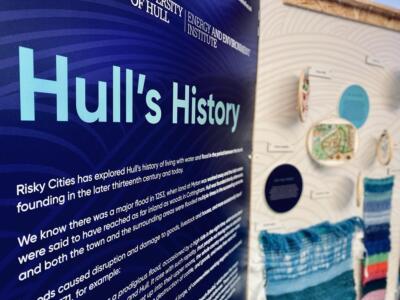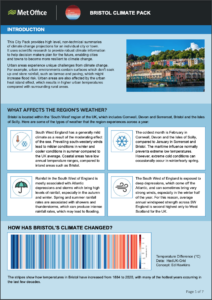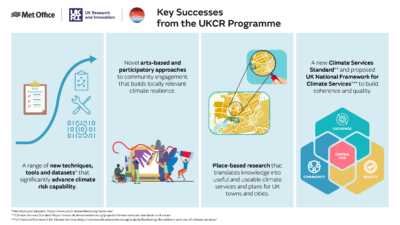The UKCR final conference took place in London on 8-9 March. Based on talks and presentations from the conference, Adam Walmesley, Met Office Senior Communications Executive, explores the key successes of the programme and its implications for practice and policy in the UK.
Since its launch in 2019, the UK Climate Resilience Programme (UKCR) has helped prepare the country for climate variability and change, and build resilience. Led by UK Research and Innovation (UKRI) and the Met Office, the programme has commissioned and funded more than 60 projects. These have focussed on characterising and quantifying climate-related risks, managing those risks through adaptation, and working with partners to turn climate information and knowledge into useable climate services. So, as the programme concludes, what has the programme achieved and how has it made a difference to the UK?
A range of new techniques, tools and datasets that significantly advance climate risk capability

By producing new tools and datasets, the programme has enhanced capability and understanding of UK climate hazards, such as extreme rainfall and heat, and the associated risks. UKCR projects have used the Met Office’s UK Climate Projections (UKCP) simulations to make advances in hazard data, which has enabled a range of outputs – such as updated guidance on urban drainage design and methods for urban surface water flood risk assessment.
Researchers have also been able to characterise and project future hazards, such as increases in the frequency of extreme rainfall during autumn, increased storminess, and a 10-fold increase in dairy cattle heat stress during the next 50 years. Climate projections have been translated into different risks affecting the natural environment, infrastructure and communities – such as increases in wildfires, damage to rail lines, and heat-related mortality. Most of the consequences are adverse, especially with higher future emissions. The programme also contributed to the UK’s Climate Change Risk Assessment 2022, and UKCR research findings are being used to help maintain future water resources as the climate changes.
Novel arts-based and participatory approaches to climate engagement that builds locally relevant climate resilience
Many arts-based and historical approaches were used to engage communities and sense-make around what a changing climate means for people in various contexts and communities. Such projects have used community knowledge and creativity to identify solutions and initiate climate action within their sectors.
 The Risky Cities project, focussing on the flood-prone city of Hull, worked with local communities to develop place-based stories from the past as a means of engaging present day communities to boost future flood resilience. Creative climate resilience worked with communities in the Manchester area to respond to climate change through folk pageantry, social practice art and animation. ‘Once upon a time in a heatwave’ used storytelling to communicate the impacts of and adaptations to a changing climate within agricultural and rural communities in Northern Ireland.
The Risky Cities project, focussing on the flood-prone city of Hull, worked with local communities to develop place-based stories from the past as a means of engaging present day communities to boost future flood resilience. Creative climate resilience worked with communities in the Manchester area to respond to climate change through folk pageantry, social practice art and animation. ‘Once upon a time in a heatwave’ used storytelling to communicate the impacts of and adaptations to a changing climate within agricultural and rural communities in Northern Ireland.
Place-based research that translates knowledge into useable and useful climate services and plans for UK towns and cities
Urban spaces are particularly vulnerable to climate change. Engagement with both local communities and decision makers is needed to develop resilience. Numerous projects focussed on place-based adaptation strategies, involving translating climate data into useful and useable climate services. These projects were tailored to specific communities, recognising the distinctiveness of each place and the importance of developing strategies with local people to ensure action meets their needs.
Through the embedded researcher scheme, strong working relationships were forged between academic researchers and decision makers in a variety of organisations. Through Manchester Climate Ready, for example, Manchester Climate Change Agency and Manchester Metropolitan University worked together to develop a framework to understand climate risks in the city, and equip sectors to take urgent and sustained action to increase their resilience. Climate Resilient Churches, an embedded researcher project between the University of Manchester and the Church of England, sought to co-develop resilience strategies for church buildings and the associated communities.
Led by the Met Office, the Urban Climate Services project focused on co-developing prototype services to provide for climate information to help communities plan for the future and build resilience. This involved collaboration between researchers and users to understand the climate risks in each place and support appropriate action.
 City Packs were developed for dozens of urban areas, consisting of facts sheets to raise awareness of how the local climate may change until 2100. Heat Packs followed on from City Packs to improve users’ understanding of how heat hazards might impact their cities, and which parts are at greatest risk from extreme heat. They also help users with emergency planning and building longer term resilience to heat events. Flood Profiles provide information for communities about past flooding events and how their occurrence may change in the future and Storymaps have been developed to communicate climate information in novel ways.
City Packs were developed for dozens of urban areas, consisting of facts sheets to raise awareness of how the local climate may change until 2100. Heat Packs followed on from City Packs to improve users’ understanding of how heat hazards might impact their cities, and which parts are at greatest risk from extreme heat. They also help users with emergency planning and building longer term resilience to heat events. Flood Profiles provide information for communities about past flooding events and how their occurrence may change in the future and Storymaps have been developed to communicate climate information in novel ways.
Local authorities have used these resources to inform their conversations about Net Zero and their adaptation strategies. They have also been used to engage with the public about climate change, to help prioritise action, and to develop other resources.
There is now an ambition to evolve the information provided and upscale services to all local authorities in the future.
A new Climate Services Standard and proposed UK National Framework for Climate Services to build coherence and quality
Climate services involve the production, translation, transfer, and use of climate knowledge and information in climate-informed decision making. They help answer questions such as: ‘How much wind energy can we expect to see in this area’? and ‘Will a hosepipe ban be needed in this region?’ Effective climate services can help society to become more resilient to climate risks. But not all available climate services can support decision making.
There are numerous benefits of having a standard for climate services including: fostering confidence and trust in services, driving-up their quality, improving the transparency of available products, increasing the accountability of providers, and providing a benchmark for all services.
The Climate Services Standards and Values project established a coherent set of standards for climate services, so decision makers can improve their capacity to manage climate-related risk. The standard – comprising principles, requirements and guidelines – is available to download as a PDF.
The programme also published recommendations for a UK National Framework for Climate Services (NFCS). The report was the culmination of an 18-month project involving 80 individuals from 60 organisations in the UK. It identified the need for coordination and centralised leadership to translate climate information into adaptation and resilience.

It also stated that a NFCS should provide a mechanism to implement new data, knowledge and practices, aligned with national adaptation and resilience priorities. It would enable knowledge exchange, promoting and implementing common language and understanding, good practice and quality standards. Another outcome of this project is that it has led to ongoing work to establish a national hub for climate services.
A lasting legacy
As a nation, we’re already seeing evidence of climate change in the UK, and can expect increasingly warmer and wetter winters, hotter and drier summers, and more frequent and intense weather extremes. The UKCR Programme has helped to better understand these risks and provide tools to help communities across the UK become more resilient. New datasets, new resources and new communities have been created to help people live with extremes as the climate changes. By using and developing these outputs in the future, people in the UK will cope better with the challenges of climate change, be able to exploit any benefits, and recovery from shocks to enable a more sustainable and resilient society.

